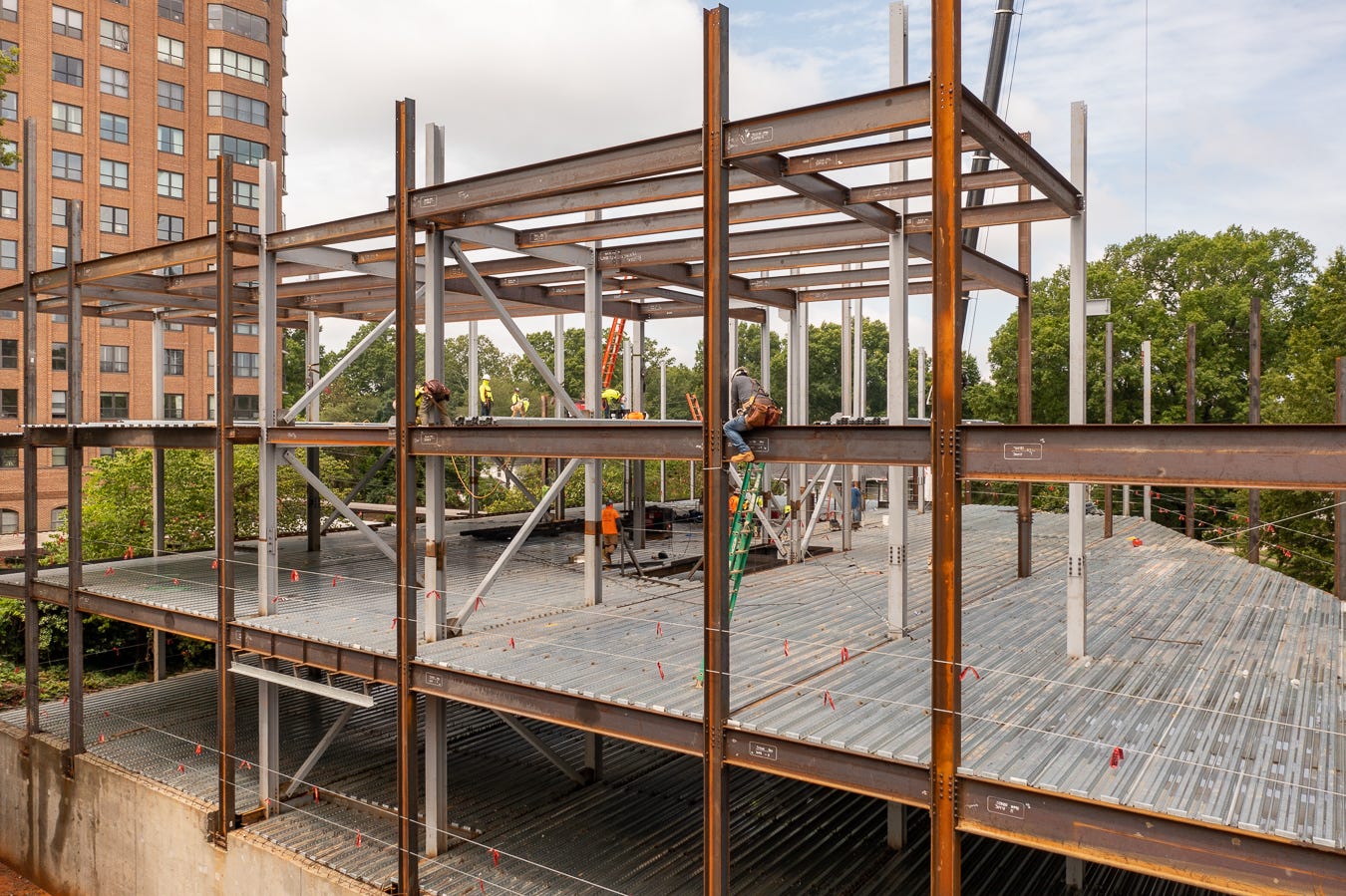For Charlotte's construction industry, Covid pains won’t quit
The following article appeared in the October 18, 2021, edition of The Charlotte Ledger, an e-newsletter with local business-y news and insights for Charlotte, N.C. More info here.
Sign up for free:
Amid a red-hot development boom, shortages squeeze builders; Prices of steel, lumber, roofing are way up, and delays become more common
Charlotte-area construction have been busy — like on these luxury condos underway in Myers Park. But it has been tough finding supplies and workers, which is causing delays of projects. (Photo by Kevin Young/The 5 and 2 Project)
By Lindsey Banks
Two years ago, Roger Hendrick, president of Hendrick Construction in Charlotte, needed eight weeks to get materials and supplies for a project. Now, he needs 24 weeks.
The serious materials shortage that’s been plaguing the construction industry throughout the pandemic hasn’t let up, and builders now say they’re especially struggling to source lumber, steel and roofing materials.
The fallout? Shortages are causing projects to be delayed and postponed — it’s a tough predicament for builders like Hendrick, who is currently working on hotel construction projects, and who just finished a Hyatt Place in south Charlotte’s Rea Farms.
Batson-Cook Construction has also felt the pain of these shortages, on the money-side. Rick Kiger, vice president of business development at Batson-Cook, said roofing prices are up 50%, lumber costs are up 300% and steel prices are up 150%. He said you can visibly notice stacks are lower at lumber mills.
Kiger has been in the Charlotte construction market for 29 years, and Batson-Cook is now at work on one of the highest-profile projects in the city, building the new Duke Energy tower on South Tryon Street.
The cause of the shortages are not new, or surprising. Covid disrupted supply chains, and a national labor shortage exacerbated delays. Charlotte did not stop growing, and the demand for new construction has exceeded the supply.
Some construction companies are desperate for workers to complete projects.
During the statewide lockdown in 2020, construction was deemed essential, but Kiger said that because some workers could make up to 90% of their wages from governmental aid, it was hard to find people to do the job.
The problem is big on a national level as well.
According to a survey released last month from the Associated General Contractors of America and Autodesk, almost nine out of 10 surveyed contractors reported they are having difficulty finding workers. Meanwhile, 88% said they are experiencing project delays and 93% said their businesses have been affected by rising materials prices.
By comparison, 52% of a similar-sized group of contractors said they were having a hard time finding enough workers in a 2020 survey.
Dave Simpson, CEO and president of the construction trade association Carolinas AGC, has seen the effect of material shortages on a larger scale.
“There is a huge demand [for] people to get into the commercial construction industry, and the demand for that has not slowed down,” Simpson said.
Manufacturers also experienced staff shortages during the pandemic, which slowed down material production and caused delivery delays. Hardware stores struggled to keep their shelves stocked with materials during the pandemic, contributing to shortages. People at home were buying up supplies to work on home renovation projects.
It’s not clear when manufacturers will be able to meet the demand again, but until then, construction companies all over the country are playing catch-up and dealing with delays.
These shortages mean companies have to plan farther ahead than usual, so they can keep the design, permitting and supply sourcing phases moving ahead. Hendrick is currently preparing to work on condos in uptown, as well as renovations to local churches and private schools.
“People continue to move to Charlotte and at a rapid pace, which is great for the economy, but it’s also making it difficult,” Hendrick said. “That takes time. So, that's going to continue to remain a challenge but also a positive growth pattern for the community for years to come.”
Lindsey Banks is a senior journalism major at UNC Chapel Hill. She was the Ledger’s 2021 summer reporting intern.
Related Ledger article:
“Why are there so many shortages?” (June 9)
Need to sign up for this e-newsletter? We offer a free version, as well as paid memberships for full access to all 3 of our local newsletters:
➡️ Learn more about The Charlotte Ledger
The Charlotte Ledger is a locally owned media company that delivers smart and essential news through e-newsletters and on a website. We strive for fairness and accuracy and will correct all known errors. The content reflects the independent editorial judgment of The Charlotte Ledger. Any advertising, paid marketing, or sponsored content will be clearly labeled.
Like what we are doing? Feel free to forward this along and to tell a friend.
Sponsorship information: email brie@cltledger.com.
Executive editor: Tony Mecia; Managing editor: Cristina Bolling; Contributing editor: Tim Whitmire, CXN Advisory; Contributing photographer/videographer: Kevin Young, The 5 and 2 Project



